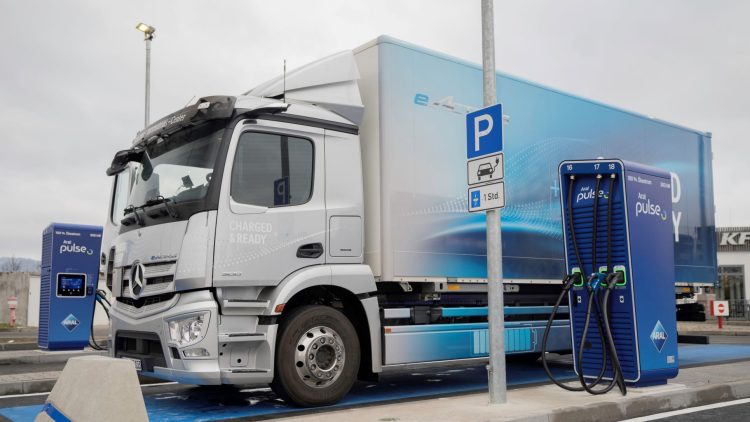Six public charging locations with ultra-fast 300kw charge points aimed at E-Trucks have been launched along a 600km stretch of the Rhine-Alpine corridor across Germany. The corridor is one of the busiest road freight routes in Europe connecting key North Sea ports in Belgium and the Netherlands with the Mediterranean port of Genoa in Italy connecting through a network of roads stretching in total 1,300km.
The new chargers have been installed on Aral retail sites in Germany between the Rhine-Neckar metropolitan area and the Rhine-Ruhr metropolitan region. Aral is bp’s German retail brand. In the next six months, two additional locations are scheduled to open on Aral retail sites to complete the new charging corridor .
Once complete, using the Aral pulse charging corridor, an E-Truck will be able to cover over 600km across Germany along one of European’s major road transport routes.
The 300kw charging stations are each capable of charging more than 20 E-Trucks, per charger each day. An E-Truck’s range can reach up to 200km in around 45-minutes using the ultra-fast charge points .
The Aral retail sites offer access to hot food, restrooms and showers for drivers to use during a mandatory rest period in addition to dedicated charging in safe, well-lit and convenient locations.
Nigel Head, EV Truck Director, Europe, bp pulse, said: “This is a significant moment for E-Trucks in Europe and an important step in our journey towards helping to decarbonise truck transportation. By electrifying this stretch of the Rhine-Alpine corridor with ultra-fast charging, bp is enabling EV Truck charging beyond “back to base” whilst rapidly learning customer insights which will directly inform our longer-term European network and proposition.
“By beginning the roll-out of a dedicated charging network for freight operators and fleets, with a focus on major logistics corridors, bp is supporting the electrification of medium and heavy-duty vehicles, decarbonising the movement of goods, as well as people. Ultra-fast charging in the right locations, combined with depot and destination charging, is critical infrastructure to accelerate the electrification transition, unlocking the economic and environmental benefits of low-carbon commercial road freight and transport.”
Alex Junge, Aral Board Member for E-Mobility, said: “The discussion about e-mobility has been focused on the passenger car sector, but medium and heavy goods vehicles are also at a decisive turning point. Our strategy is designed to meet this demand with the right infrastructure and our first public electric truck charging corridor in Germany is an important milestone on this path.”
Johannes Pallasch, from Germany’s National Centre for Charging Infrastructure, part of the Federal Ministry for Digital and Transport said: “To reduce CO2 emissions in road freight transport significantly, e-trucks will play a central role in regional and long-distance transport. As with passenger cars, the switch to electromobility can only succeed with a reliable and needs-based charging infrastructure. With today’s opening, Aral is taking an important step in this direction.”
By 2030, it has been estimated that approximately 270,000 battery electric medium and heavy-duty vehicles will be in operation in Europe and they will require up to 140,000 public and destination electric charging points . This transition is already underway; the German truck fleet is now over 3.5 million vehicles and bp pulse launched its first ultra-fast-charging facilities for medium and heavy-duty electric trucks in Schwegenheim, Rheinland-Pfalz.
In addition to developing new dedicated electric charging sites, bp also aims to create a network of mobility hubs along key logistics corridors across Europe providing freight operators with a range of energy options, including traditional fuels to support our fleet customers at every stage of their decarbonisation journey. bp has a global ambition of having more than 100,000 chargers installed worldwide by 2030 focused on ultra-fast charging.
Photo: bp



